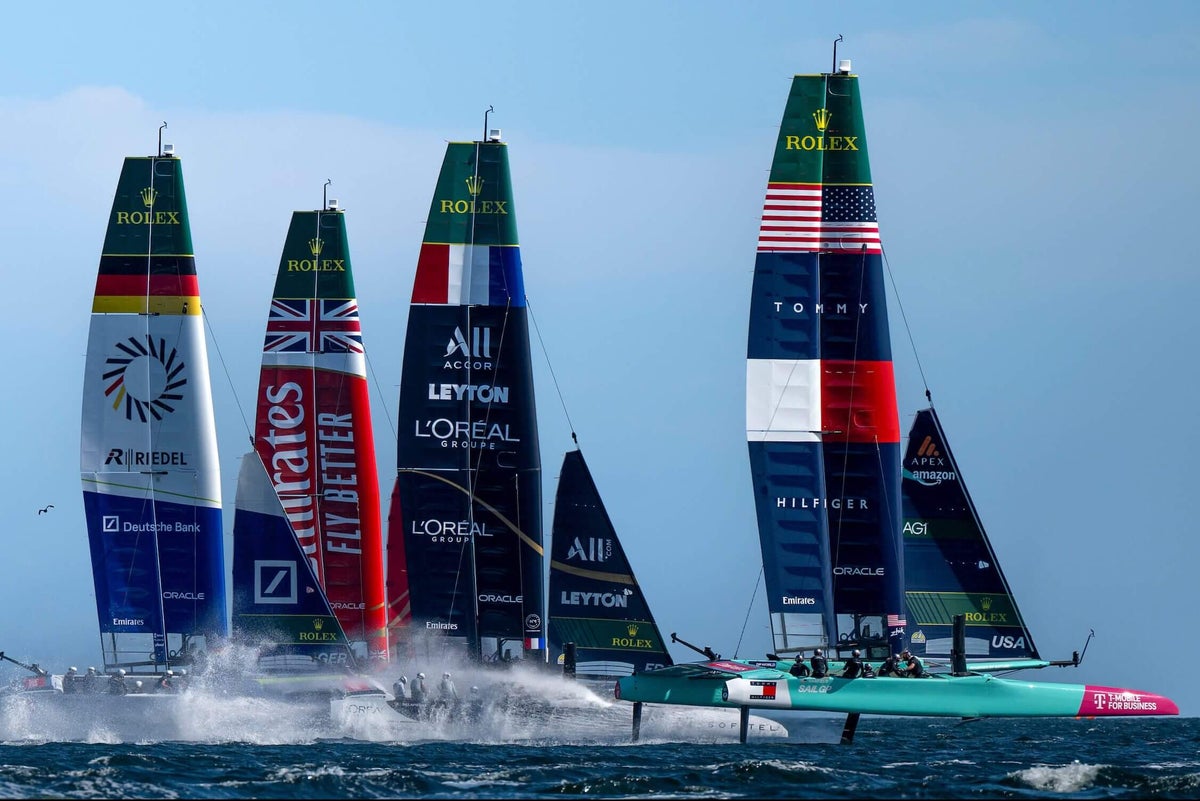A collision between the American and British teams marred the end of a dramatic opening day of competition at the Germany Sail Grand Prix Sassnitz.
On a converging port v starboard tack collision course on the upwind leg on the fourth and final race, Taylor Canfield’s U.S. team failed to spot Dylan Fletcher’s British red F50 until the very last moment. Even the British strategist Hannah Mills could see disaster unfolding as the American boat ploughed on towards the back of their F50.
“They’re not doing anything … head up, head up, head up,” she told her driver Fletcher with growing alarm as she sought to minimize the impending impact.
The collision snapped off the first couple of metres of the Americans’ left-side hull and caused enough damage to the back of the British boat to take them out of the race.
After a scary practice outing on Friday, with major damage to the French and Brazilian boats, this collision was the last thing anyone wanted for the first day of racing proper.
OH NO 😬
A massive incident to end Day 1 in Sassnitz as @sailgpusa hit @EmiratesGBRSGP 😱
The US team will receive -12 event points for this incident and we are thankful to report all athletes are safe and accounted for ⛵️ pic.twitter.com/mrDhNTwUOF
— SailGP (@SailGP) August 16, 2025
Twenty-four hours earlier a T-foil rudder ripped off the back of the French boat as driver Quentin Delapierre was executing a high-speed bear-away manoeuvre during one of the practice races.
Fortunately the large chunk of fly-away carbon-fiber foil soared high into the air but nowhere close to the French crew. However, Delapierre was flung forwards violently by the rapid deceleration and suffered a nasty face-plant into the boat’s cockpit. He was taken to hospital and later signed off as fit to go racing on Saturday.
It was worse for the Brazilians as — just seconds after the French incident — the front cross-beam of their F50 snapped and the catamaran collapsed into its constituent pieces, with the wingsail falling to the water. To the surprise of many, no one was seriously injured in either incident.
This put the Brazilians out of action for the weekend while SailGP’s boat repairers worked feverishly throughout the night to get the French back on the water for Saturday. The boatbuilders are facing another all-nighter if they’re to get the Americans and British back up and running for Sunday’s concluding races.
With all that had happened the day before, another strong-breeze forecast brought some trepidation for the sailors as they headed out for four races in shifty, gusty wind conditions. A critical difference was that the F50s were today equipped with the shortest, smallest 18-metre wingsails, a significant reduction in sail area and power compared with the 24-metre monster wings on the practice day.
Great Britain shot out to an early lead in race one although were caught out by the Germans in the closing stages, Erik Heil’s team wowing the home crowds with a race victory, their first since the opening event of the season in Dubai last November. The U.S. team came across the line in third place, Taylor Canfield’s best showing in a while.
Fletcher’s crew made amends in the next race, the British making good gains in the gusts on the downwind leg to haul their way past early leaders Spain. At this point in the day, Britain were flying high with a good lead at the top of the rankings.
The start of race three was Denmark’s time to shine, Nicolai Sehested spearing his F50 around the first mark to a speed of 103.93 kmh — a new SailGP speed record, eclipsing the 99.97kmh previously held by France. The combination of the T-foils, the new lower-drag set of foils for this season, combined with the small and low-drag 18-metre wingsails, was pushing the boats to high numbers all afternoon until the breeze started to drop for the fourth and final race.
Australia would go on to win race three ahead of the Danes, and Tom Slingsby pushed arch rival Pete Burling and the New Zealanders for victory in the final race. The Kiwis held on to win ahead of Slingsby, but in the overall standings it’s the Australians who hold top spot at the end of a hectic day with an eight point lead over New Zealand who are pretty much on equal points with the next three teams — France, Germany and Spain.
Sunday’s final three fleet races get underway at 3.30pm local time in Germany, after which the top three teams will go forward to the sudden-death final to decide who wins in Sassnitz.
(Photo: SailGP)
